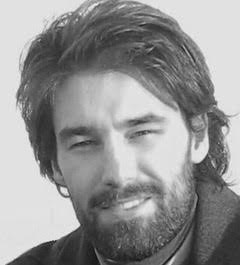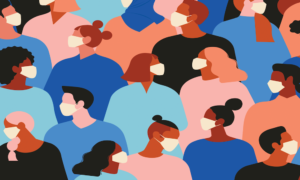(Editor’s note: This post on the ethical issues posed by coronavirus measures originally appeared in The Economic Times. It’s reposted here with permission. The views expressed here are the author’s and not necessarily those of our editorial team. See our post here for daily updates on what countries are doing to mitigate the pandemic. )
By Calum Nicholson, TES UK Correspondent
There is a famous piece, by the comedian Louis CK, widely known as “of course … but maybe.” The clip‘s subtle power and disarming truth doesn’t survive transcription, but in it the American makes an important point: there are many things in life that, of course, are incontrovertible.
But maybe, just maybe, things are more complicated than the phrase “of course” implies. And as our societies clamp down on civil freedoms, and shutter shops, and with them the economy – all in the pursuit of protecting as many people from the coronavirus as possible, which is of course important – just maybe we should nevertheless consider whether taking such measures is in fact the right decision, and whether the cost of doing so is worth bearing.
Could doing the ‘right thing’ cause more harm than good?
One of the emerging features of the discussion over how to respond to this virus is the almost complete absence of “but maybe” arguments from the mainstream conversation. This is hardly surprising – it is in the nature of gross tragedies or injustices for the sense of horror or fear to be so deep, natural, and universal that it feels contrary, cold, and distasteful to suggest anything other than that – in this case – everything possible should be done to mitigate mortality caused by the virus.
But maybe … just maybe indefinitely shuttering the entire economy, and closing all schools, and suspending virtually all of life as we know it, might in the long-term do more harm than good.
It may indirectly kill more people than the virus, similar to how the collapse of the Soviet Union caused a spike in deaths from suicide and stress-induced alcoholism. It will almost certainly destroy much of the collective culture and economy – and do vast qualitative and permanent damage to the socio-economic fabric of society.
In the pursuit of protecting a minority of a retired generation, who are already the healthiest and longest-lived of any in human history, we are genuinely at risk of retiring the very concept of retirement – among other 20th century luxuries – as a norm and expectation for future generations of the majority.
How to weigh this trade off?
The effect on mortality of continuing as normal is direct, quantifiable and immediate. By contrast, the consequence of suspending normality is indirect, largely qualitative, and mostly eventual. Comparing them is all but impossible. But making a decision on which is more important is nevertheless what we must do.
Death, risk and loss
And as CK’s piece makes clear, to take a “maybe” position is not to say one does not care. Of course we should make every effort to protect everyone. I myself have septuagenarian parents who are in the vulnerable demographic, and I’d be devastated if anything happened to them. But maybe … maybe in our culture we are a historical exception in our attitudes towards death, and risk and loss.
And maybe in attempting to preserve the belief – unique to the late 20th century and early 21st century – that with the help of science and rationalism we can control our individual fate, we risk sealing our collective one as an aspirational society. What cost – tangible or intangible – is in the end acceptable to avoid being confronted by our limits as a society, and as moral actors?
Unlike how we understand the virus itself, not to mention mitigation strategies, the question of whether we should sacrifice everything else in our society and economy and culture in the pursuit of mitigation does not have a scientific or objective answer. It is a subjective question of values, and of politics. And as such, it should not be taboo to debate it, however uncomfortable.
The status of death in our culture
Central to this debate is the status of death in our culture. And central to understanding that status is an understanding of how it has changed, and how historically exceptional our current zero-tolerance for mass mortality in fact is. Faced with poverty, war, violent crime, the circle of life and disease, mortality was a constant concern and preoccupation in the lives of even the wealthiest people until the early 20th century.
Before sanitation and welfare; before volunteer armies, long distance ballistics, and drones; before Peel’s police; before antibiotics, Fleming, and modern midwifery; before epidemiology and microbiology, death was a spectre haunting the lives of everyone.
It was in part the very basis of religious faith itself – it being the best defence most people could muster against the vicissitudes of fortune, and the ultimate misfortune. It is no coincidence that, historically, faith contracts as control over our fate dilates. Today, our predominantly secular public culture reflects the general belief that we have replaced fate with fact, and a general sense that death has become less a matter of theology, more a matter of technocracy.
Whereas in the past, the stories told were of miraculous survival against the odds, today the stories we tell are of death against the odds. Where once the exception to be explained away was life, today the exception to be accounted for is death. Why did it happen? What mistake was made? Who is responsible? In our technocratic, risk-averse culture, we have so systematically inoculated ourselves against risk, that death – on the road, in the air, at the front, while at work, or in the ward – has become a morbid curiosity demanding explanation, that we may identify the error in the cultural code to be corrected, so that the death in question is never replicated.
But this attitude to death is the historical exception, not the rule, and in this current crisis, it is crucial that we realise our attitudes to it are shaped by the exceptional period we have just lived through, since the end of the Second World War. The sixty-four year old Maria Shriver recently said that her generation had “seen a lot” in their lifetimes. This is true only to a point. The baby boomer generation – those most at risk from this pandemic – have, as a cohort, certainly seen the most of any generation in human history, given their lifelong freedom to travel, access to telecommunications, and longevity. But have they actually experienced the most?
Have they experienced pandemics, wars, cataclysms on par with those that blighted the lives of their ancestors?
Clearly not.
Attitude frozen by fortune, not forged by war
Their attitude to risk has been frozen by fortune, not forged in fire. This idealist frame of reference could have cataclysmic consequences in the current crisis. The “othering” of death and “fetishizing” of life in our culture – which glorifies youth over experience, the individual over the collective, longevity over meaning – has led to a deafening silence on the question of whether we should, in fact, be seeking to mitigate the virus at all costs.
CALUM NICHOLSON
The focus, as a result, has been on how to do this: Governments claim to be ‘science-led’ in their efforts, a claim that implies there is no discussion of values to be had. But ultimately this is a question of values and philosophy, not science. And what we’re learning through this crisis are that many of our age’s most exceptional values – individualism, the rule of the market, the globalisation of everything, not least supply chains – are in fact exceptional in a much more prosaic sense: they are revealed to be fair-weather ideas – interesting ideas for easy times.
But in interesting times, they are uneasy ones. And perhaps most uneasy of all is our collective attitude and orthodoxy toward risk. For decades, there has been the gradual and inexorable – some would say viral – spread of risk-aversion across the culture. Sector by sector, year by year, the lawyers have shaken their heads, and drawn – in red ink – the circle of acceptability more tightly. In an attempt to limit the quantity of risk, we have seen a great sacrifice in quality of experience.
As the paperwork has grown, and as the concept of liability entered into the calculus of all we do, we’ve seen the dwindling of everything from the school field trip, to what is acceptable speech; from the time police, teachers, and doctors can dedicate to their primary duties, to the number of people who can afford to set up a new businesses, still less make a success of them. The current crisis likely marks the end to all of these trends, which have increasingly dominated human society for half a century.
The emergence of the coronavirus itself undermines the long-term practicality of global outsourcing and supply chains. The collective nature of our vulnerability and mitigation efforts in the face of the outbreak dissolves the figment of the bounded individual. The sudden necessity of the nation-state reveals the market to be no panacea in a pandemic.
Risk aversion one of the biggest risks we face
And taken to its logical extreme, a culture of risk-aversion is itself revealed, paradoxically, to be one of the greatest risks we face, with its potential costs being systemic and devastating for both the society and economy, both globally, and in the long-term. Individualism, unfettered markets, and globalisation are of course wonderful things. But maybe they are luxuries afforded by times of prosperity, not the foundations on which that prosperity can be built.
And of course, risk and mortality are terrible things. But maybe their avoidance should not be at all costs. If we can find it in ourselves to break conventions and taboos of our recent history and culture, and recognise that maybe the world is more complex and subject to less control than we have hoped, perhaps we’ll find, in the ashes, and the tears, and in the wake of this pandemic, fertile ground for nurturing something new.
Specifically, a society that escapes the naive idealism of the past 70 years, and embraces a more hopeful realism. And in doing, just maybe, we might even find ourselves in possession of a cure for the fever that has gripped our politics in recent years.
Calum Nicholson is UK Correspondent for The Economic Standard. Twitter: @CTMNicholson—

About the author:
Dr Calum T. M. Nicholson is an instructor at Cambridge University and has worked as an advisor to parliamentarians. His research interests encompass forced migration and migration studies with particular and long-standing reference to the debate on “climate-induced migration.”
Philosophically, he is interested in developing heuristics for unpacking the epistemological and ethical assumptions implied in research and policy that hinges on establishing determinative causal claims and distinct labels and categories.














